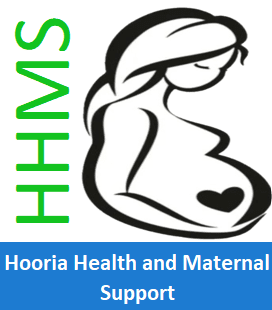What a Doula Brings to the Delivery Room

Posted on October 20th, 2025
Introduction: The Room Where Time Stands Still
It’s 2 a.m. The hospital lights are dim, and the monitor beeps steadily. A woman breathes through another contraction, her hand gripping the side of the bed. At her side stands a doula, still, grounded, calm.
She doesn’t speak over the nurses or the doctor. She doesn’t rush. Her presence fills the space between fear and focus. This is the quiet work of a doula, invisible to some, unforgettable to others.
Before the First Contraction: Setting the Tone
Hours earlier, she arrived with a soft smile and a small bag of essentials, oils, snacks, affirmation cards, and warmth. She listened first: to the mother’s breathing, to her tone, to what wasn’t said.
At Hooria Health and Maternal Support, every doula begins with this kind of listening. Before offering comfort, she learns who this mother is, her fears, her faith, and her hopes for this birth.
That understanding shapes everything that follows.
During Labor: A Calm Voice in a Busy Room
In the delivery room, everyone has a role: the nurse monitors vitals, the doctor manages progress. The doula’s role is subtler: to hold emotional space.
She notices the mother’s shoulders tense, the breath shortening. She whispers, “Breathe with me.” Her tone is steady, her rhythm matching each wave of pain.
When medical terms fill the room, she gently translates. When decisions need to be made, she helps the mother pause, ask questions, and find her voice.
She is not there to lead, but to center.
Advocacy Without Interference
One of the most misunderstood roles of a doula is advocacy. It isn’t confrontation, it’s collaboration.
A Hooria doula ensures the mother’s wishes, expressed in her birth plan, are heard and respected. She might say to the nurse, “She prefers dim lighting,” or to the doctor, “Could we explain that option once more?”
These small statements protect a mother’s autonomy while maintaining harmony within the care team.
A doula is both guardian and guide, standing quietly at the intersection of compassion and communication.
Moments of Stillness
Between contractions, she applies warm compresses to the mother’s back. She offers sips of water, wipes a brow, whispers prayers in familiar words. Sometimes, she simply places a hand over the mother’s heart, saying nothing.
In those pauses, connection deepens. The mother feels safe. Seen. Supported.
This is what a doula brings that medicine cannot measure.
When Birth Unfolds Differently
Not every delivery follows the plan. When a cesarean becomes necessary, or labor slows unexpectedly, fear can rise fast.
A doula stays steady through the change. She reassures, explains, and remains present, the emotional constant when everything else shifts. She doesn’t promise perfection; she promises presence.
That alone can turn anxiety into acceptance.
After the Birth: The First Quiet Hour
The baby cries. The room softens. The doula steps back, giving space for skin-to-skin, for tears, for stillness.
Later, she helps the new mother sit up, sip water, and take her first deep, unhurried breath as a parent. Her job isn’t over when the baby arrives; it continues through that fragile hour of awe, fatigue, and beginning.
The Invisible Thread
Most people in the delivery room may not even notice the doula’s quiet orchestration. But the mother will remember how safe she felt, how steady the energy stayed, how her body and mind worked together instead of against each other.
That memory becomes part of her story, one she’ll carry for life.
Final Thoughts: Presence Is Power
A doula doesn’t replace medical care; she enriches it. She brings presence where there’s pressure, peace where there’s fear, and humanity where the moment feels overwhelming.
At Hooria Health and Maternal Support, our doulas bring cultural understanding, warmth, and advocacy into every birth space, ensuring that no woman ever feels alone in her journey to motherhood.
Contact Hooria Health and Maternal Support today to start a conversation about bringing a doula into your birth experience.
Contact Us
Reach Out Today
Explore our caring maternal health solutions designed for you. Connect with our team today and begin a journey towards empowerment and support for you and your family.
